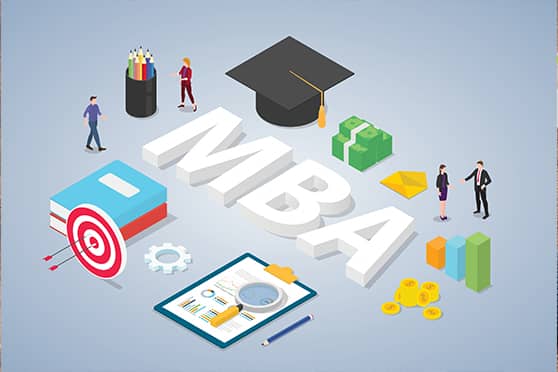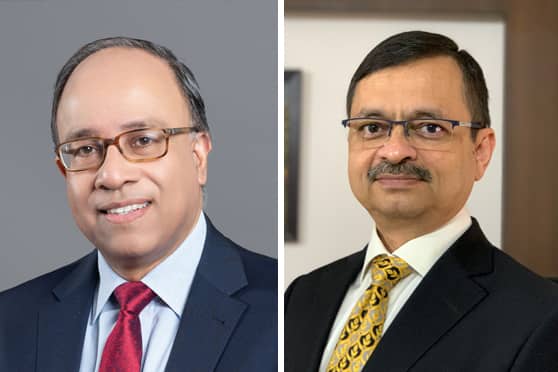Mahindra University launches Executive MBA for working professionals


Does learning end when you leave college or university? Think again! Learning is an ongoing process and even middle to senior-level professionals require to stop, rethink, imbibe and apply new methods to shine in their careers. Keeping this in mind, Mahindra University has launched a two-year Executive MBA (EMBA) course for working professionals. Applications for the current batch are open.
Edugraph caught up with Ramakrishna Velamuri, professor and dean, School of Management, and Sanjay Singh, professor and programme head from Mahindra University, for a lowdown on the course and its benefits.
Edugraph: Tell us about the Executive MBA programme.
Ramakrishna Velamuri: In India, traditionally we have had MBA pre-work experience, which was popularised by the IIMs. Most people join the IIMs do immediately after graduation. I graduated nearly 40 years ago. In those pre-liberalisation days, the Indian economy was small. The IT service industry was almost non-existent and there were simply no job opportunities for people who had just completed graduation. Many youngsters chose to do an MBA without any experience. It was the next logical thing to do. The boom in the IT service industry brought a lot of changes in India. One of the things it did was to create huge employment opportunities for graduates. People with a starting salary at IT companies could support themselves in metros like Delhi and Mumbai.
People with a bachelor’s degree have lots of opportunities. So, most people end up working immediately after graduation because sometimes they need to repay education loans. They think of doing an MBA four to five years later. So, the market for the Executive MBA (EMBA) programme is much bigger in the West than it is in India. In India, it is growing. In India, the cost of studying for a full-time MBA is comparatively high. Also, a full-time MBA does not work for a person who has five to 10 years of work experience because what they need to learn is not offered by the full-time course.
What makes this course special compared to other MBA courses?
Velamuri: In a full-time MBA, the emphasis is more on technical subjects such as decision sciences, production and operation management, accounting, finance. In an EMBA, we teach those same subjects but the emphasis is much more on leadership, strategy, entrepreneurship and the strategic aspects of finance and accounting. For example, the focus is more on how to design incentive systems.
For the experienced segment of the population, EMBA has recently gained popularity in India. We at Mahindra University have chosen to launch our first EMBA programme. We will hopefully launch a full-time MBA next year.
Since it is primarily aimed at professionals, how would the course help in upskilling their knowledge?
Sanjay Singh: A graduate from college would typically start in a functional role. As they grow in the functional role, complexities begin to appear in their professional lives. They are also on the cusp of transforming from their functional roles to taking on general management roles. For instance, someone enters the workforce in the sales role, then become sales head, zonal head, and national head. While a person might be an expert in selling, he does not know how the goods are produced, what it takes to produce the item or service, what it takes to finance that, marketing, and building brands. These are the kind of challenges one faces while transitioning from a sales role to a business head role.
When people realise that their training and education had lasted them till a point but that going forward they would need to get newer skills to help them become a well-rounded business leader, programmes like EMBA come in. When they have these skills, they will automatically get noticed among their peers because the way they approach problems would be more holistic. They will stand out.

How can a candidate enrol in the course? Are classes online or offline?
Singh: The application forms are available on our website. We will shortlist candidates based on the written application, profiles, the quality of work experience they have had. We will then invite them for a personal interview. After that, we will finally decide who to offer admission to.
We are offering 30 courses in the programme. Six of them will be taught online. The remaining 24 will be in the classroom. For programmes that cater to senior candidates, almost half the learning takes place at the classmates. They come in with rich experiences from other fields. So, the classroom discussions and case study methods enrich and enlighten the students.
What are the facilities provided to them to balance education and professional life?
Velamuri: This programme entails a significant sacrifice in terms of time commitment and students will need to juggle a few things. First, very often, those with 10 years of work experience have young families. They have to make sure that the family is on board with this decision. Second, they will have to juggle their studies. Third, generally, people who take these programmes are high-potential candidates relied upon by their organisations. They need to speak to their organisations and we require a written letter from the organisations.
Singh: Those signing up for EMBA programmes are highly self-driven. So very few of them will like to skip classes. At this stage in life, they are not here to get a degree but to learn and update themselves. So self-motivation itself takes care of other issues.
The EMBA programme comprises several residencies. Could you throw some light on them?
Singh: A residency is a teaching week that happens on campus. The students can fly in from any city. They come to campus for classes. Towards the evenings, they prepare for the next day, do group projects, class discussions, examinations, assessments, and quizzes. Assignments are given to them to ensure that they come prepared to the class the next day.
Also, we keep them engaged in between residencies as well. There is a post-residency project, which helps them reflect on the concepts that they have been touched upon. They apply these concepts to their projects and reinforce their learning. A one-week residency is held once every two months except for the first one and when we go to Europe.
Would interested candidates be eligible for any scholarships from Mahindra University?
Singh: There are a few scholarships that we have. By and large, working people can afford the course. Also, our fee structure is fairly competitive. But we have a limited number of scholarships for people from government, women and armed forces groups.
Often, certain components of management studies coincide with entrepreneurship studies. Would this course make the students ready to take the plunge in their entrepreneurship journeys as well?
Velamuri: What we teach in the MBA programme serves both entrepreneurs and corporate managers. We believe that corporate managers also have to be entrepreneurs as they have to keep launching new businesses. We provide entrepreneurs with a solid ground through this course. One of the fundamental myths about entrepreneurship is that entrepreneurs need a different education than a professional manager or corporate manager. If you look at the Indian entrepreneurial landscape, it is full of MBAs. I can name at least 100 companies whose founders have an MBA.
Twenty-five to thirty years ago, Indian education did not have good content (course designs) to educate entrepreneurs in overcoming the initial stages of setting up a business and surviving. Business schools have always been very good in the growth stages. But starting from the dot-com web boom in the late Nineties, business schools have developed exceptional content (course structures). Colleagues who are entrepreneurs and teach in different business schools now have outstanding materials to sensitise youngsters on how to set up a business and navigate the initial phase, which is very risky.
Singh: We end the programme with a project. Those who are interested can do a business plan as their project, using all the materials they have learnt.
Click to apply: https://www.mahindrauniversity.edu.in/emba